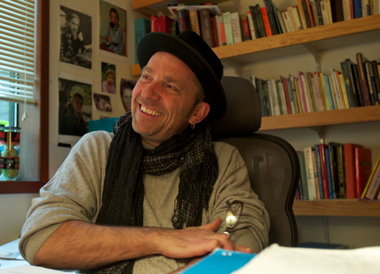Dědictví Václava Havla
Vaclav Havel’s legacy
Lewis & Clark professor and Havel translator Stepan Simek talks about the playwright-turned-statesman

Stepan Simek, associate professor of theater at Lewis & Clark College of Arts and Sciences, talks about professional and family connections to the life and work of Vaclav Havel, the Czech playwright-turned-president who died Sunday. Snímek DOUG BEGHTEL / The Oregonian
In a sense, you could say that Stepan Simek had a connection with Vaclav Havel from the cradle to the grave.
The two men met and spoke just once, at a party in the 1990s, while Havel, the world-renowned playwright and anti-Communist dissident, was serving as president of the Czech Republic. Their official connection came years later, when Simek, a native of Prague who now is chair of the theater department at Lewis & Clark College, was selected to translate one of Havel’s plays for a festival honoring the statesman’s 70th birthday.
But there was another link, through the social bonds of the intellectual class in Prague of the 1960s.
The funny thing is that my parents and grandparents were very good friends with his parents, Simek says. When I was born, the Havels gave my parents this cradle — a pink, wooden painted cradle — that Havel himself was cradled in. And I was cradled in it and it still is in my family’s possession.
Havel’s death on Sunday has inspired an outpouring of tributes around the globe. And even as Simek sits thousands of miles from his homeland, in his office in the college’s Fir Acres Theatre — where he’ll direct his translation of Havel’s “The Increased Difficulty of Concentration” this March — he speaks of Havel with something more than a philosophical or academic appreciation.
I just got a phone call from my brother, Simek says. He said, ‘I just laid two roses on Havel’s casket. One for you and one for me.
This account of Simek’s conversation with The Oregonian has been edited for clarity and brevity:
You left your native country in 1982, at 19. What kind of impact did Havel have in the Prague of your youth?
He was extremely well-known, of course, among all the people that my family and I associated with – in terms of the intellectuals, the educated classes, those who were not members of the Communist Party. But he was known mostly as a dissident, as a political figure. He was known very well as an opposition figure. Of course nobody would admit to knowing about him.
He was known, too, as a playwright, somebody who jump-started the period of a great flowering of Czech theater in the 1960s, especially in terms of the small studio theaters. He was really right there at the beginning of the small theaters in Prague that started doing interesting stuff.
There was this whole class of people who were mostly descendants of the bourgeois classes before the Communist takeover in 1948. There was this atmosphere among these people that if you are educated that means you go to the theater, that you are well-read. There was this genteelness, even more so because they were living in this Communist society and there was this incredible desire to live a life of refinement and culture in those deadly surroundings, especially after the Russian occupation. To have something to hold onto of a cultural identity and an appreciation of things of intellectual depth or aesthetic beauty was considered on some level an act of opposition to the Communist drabness.
A way to stay in touch with the soul of freedom, if not freedom itself?
Yes, and staying in touch with that part of Czech history that had been suppressed by the authorities.
What also was very important for the Czechs was that Havel, early on, became a world figure, as a playwright. Those three big plays he wrote in the ‘60s — “The Garden Party,” “Memorandum” and “The Increased Difficulty of Concentration” — played all over the world. He was included in Martin Esslin’s book “The Theatre of the Absurd,” right there next to Beckett and Ionesco. He won an Obie in 1968, when Joseph Papp brought him over to New York and produced his work; this is why he just so much loved America, because of that experience in 1968.
Those people who did know his writing, was that mainly through copies snuck back into the country from other places?
The plays from the 1960s were printed, so you could find those. Then of course there was samizdat, where people were typing and re-typing things, and those were circulated underground. But the plays he wrote in the 70s, when there were a number of directors and actors who were as forbidden as he was, they would do apartment performances. Those were often recorded and the tapes would be passed around.
Havel is well-known for having been a playwright, but in the U.S. at least, his plays aren’t that frequently produced or well-known. Is that because theaters here shy away from translations, or are the plays too tied to their original cultural and political contexts, or have the translations been bad?
All of those things, yes and no. American theater just doesn’t produce many plays from abroad. Look across other countries and you will see Havel plays produced much more often than here. The big plays of his — that are talking about the role of the individual in a bureaucratized, mechanized system and thus have the broadest appeal — they’re from the 1960s and its the theater of the absurd and that is somewhat out of style now.
The phrase that comes up over and over in the obituaries is “moral authority.” That comes from the clarity of his writing, his persistence in the face of imprisonment and his willingness to step forward as leader of a movement and then of a nation?
Yes, and also again because he became such a world figure. That was very impressive to the Czechs. Here we are this tiny little country and now we have this man who seems to be so admired all over the world, so there must be something to him.
He never really changed or wavered. Despite marrying the actress or becoming a millionaire, his message was always the same: We need to be truthful.
Do you feel that that moral authority is discernible in his plays? Or is it something that arises in part out of the attention that the plays and other writings attract?
He’s somebody who’s working on several tracks. He’s working on a track as a playwright where he’s putting out ideas, a description of the alienation of individuals in a bureaucratized world, about the ways in which language can be deceptive. They’re very funny — this shouldn’t be forgotten. He writes absurd farces, for the most part.
And he’s not portraying himself, in the more personal plays from the ’70s, as being some sort of a saint. He often points to the dissident in an oppressive society as maybe being as foolish as those who are just going along with the system.
I have this quote here that I wanted to read, what Havel said about what theater should do. “What should theater do, actually? According to my opinion, it should awaken in man his authenticity. It should help him to become aware of himself in the full span of his problems, to understand the situation in which he lives, to provoke him to think about himself. However…when the theater doesn’t try to awaken in a man a consciousness of his real problems but on the contrary helps the natural tendency to solve these problems superficially, then the theater is not what it is supposed to be.”
He’s talking about a relationship with the world outside of you, and a relationship to truthfulness. And comedy is a great way to tell the truth. And according to everyone who knew him that I’ve talked to, he was a very funny man.
He was very intent to talk about morality in politics, about truthfulness and some hope for a humanistic approach to life and the world. How a system and an individual can cooperate in order to create something that is truthful.
Do you feel the comparisons of Havel to Mohandas Gandhi and Martin Luther King, Jr. are apt?
Yes and no. I think that they may be apt when you’re thinking about moral authorities, that he is on par with Gandhi and King. But I don’t really think he was ever really in the kind of danger that they were in. It’s bad that you are thrown in prison for writing a letter, but it wasn’t like he was tortured. He was sick and they didn’t give him the right medicine, or whatever; Gandhi and King were in mortal danger.
But they stood, all of them, against what was wrong and they were very brave and had a clear moral compass. And were fallible human beings, right? That was another thing about Havel: He was a womanizer and he drank a lot and smoked too much, all that sort of stuff.
It’s interesting, talking about morality. It’s almost as if I have to correct myself, because the Czechs never really talk much about morality, and Havel actually doesn’t talk much about morality either. He talks about decency. Which I think is different.
Well, is it?
The term morality has a baggage to it. It has a very religious connotation, also.
It’s often connotes a kind of internal purity rather than an emphasis on how you treat others. Is that what you mean?
If you define morality by that kind of notion — kind of a cleanliness — I think you can be an immoral person who still has a very strong sense of decency. The Czechs don’t really use the word morality much. It’s decency, human decency. It’s important to be a decent person.
I remember I saw this Czech movie which was so lovely, set in the Second World War in a little town where there are these two people hiding a Jew. And they hate hiding the Jew. Because they are scared, and they’d like him to leave, and they know it’s just so stupid to be hiding a Jew during the war. But they hide him. And there’s this other guy who is a Nazi collaborator who finds out and seduces the wife, telling her that he won’t tell if she has sex with him. He’s a nasty character, but later, though he would benefit if he turns them in, he doesn’t. So you have this variety of people who are behaving in awful ways, but they don’t give up the Jew. There’s a sense of decency involved. If shoves comes to push, they will be decent people.
That’s a very interesting kind of a concept. And I think that the Czechs in general are more realistic about the idea of morality.
Another thing that’s been written is that he came to personify the soul of the Czech nation. Do you agree, or is that merely a platitude?
I think it’s a platitude. There are no souls of nations. If he heard that, he’s probably turning in his casket now.
It’s been asserted that, over the past couple of decades, Havel became a more exalted figure internationally but that at home his reputation faltered. What’s your perspective on that?
It’s complicated. In 1989 he becomes the voice, the central moving figure of the anti-Communist Revolution. This tiny little shy man who has trouble pronouncing certain words and has trouble looking people in the eyes, who’s incredibly polite and courteous, almost single-handedly negotiates the departure of the Communist authorities. Everybody knows that he has been imprisoned repeatedly as a dissident and he’s written all these humanistic, humanitarian and philosophical treatises on the need to be truthful and loving. And he becomes the symbol of that revolution and the first president of the post-Communist country. And everybody loves him.
But as it goes, you have a newly liberated country politically but also economically. The economics take over at some point. And at the center of the country you have somebody who is an idealist, a philosopher-king, who starts looking around and noticing that these ideals are being perverted by a market economy. He’s a social democrat, he’s not a capitalist.
So there develops an attitude about him that he’s just a little dreamer, a guy who always complains about things, about losing our moral compass. And they say, „Moral compass my (eye)! I need a new BMW!“
That was No. 1. No. 2 was that his first wife, who was very highly admired and was with him through thick and thin, she dies. And within a year or so he marries this Czech TV actress — this bimbo, everybody thinks.
And one must not forget, he came from an incredibly wealthy family. His father and grandfather were the biggest real estate developers in Prague. They owned huge buildings and whole blocks of apartments. So when the restitution came, post-Communism, he gets those back. Overnight he becomes one of the richest people in Europe. But he still talks about how money is not important….
In the Czech Republic they are doing so well economically, but there’s a pissiness about everything so often. So many people were complaining about Havel and making fun of his gentleness, but now that he dies there are literally hundreds of thousands of people lighting candles. The nation is realizing what this man has done for them.
I read something by guy who was in line to lay flowers at Havel’s casket — there are people standing in line for hours and hours — and he said, “Every year for the last 20 years, whenever I traveled abroad I sent Vaclav Havel a postcard, thanking him for making it possible for me to travel. And I always got a personal reply.”
That makes it so touching.
There may have been other people who could have led a revolution just as well. But he was a shy, unassuming, incredibly courteous man who somehow managed to carry the beauty of idealism.
You’ve mentioned previously a Pushkin quote that you like: “The translator is the carrier of the human spirit.” What about Havel’s spirit is clearer to you from having the intimate involvement with the work that translating requires?
It really occurred to me so clearly that he is truly a man of the theater. This play is the most farcical of his plays, and he is just so much at home with the mechanics of the theater. The treatment of language made me realize that for him the language in a play is a character. I realized how very funny he is, at time screamingly funny. He is an absurdist playwright, whatever that might be, but in his plays there is an absolute iron logic to the nonsense. Which is really important.
You know, he started as a stage hand, so there’s a real sense of him understanding the space and the timing of the theater, which I did not realize before.
Do you think that’s part of what made him an effective politician?
Maybe. Yes. He has a big essay that I’ve read about staging politics.
Which is not just staging events, but manipulating, in a sense, the development of ideas, the timing of tensions, and so on.
It is entirely possible. That would be an interesting study.
In a hundred years, will he be better remembered as a political leader or as an artist?
As a political leader. But they’re not really divisible in him — the artist, the politician, the philosopher.
I believe that of all the revolutions in 1989, the revolution in Prague is the most firmly planted in everybody’s memory because there was something immensely romantic about this poet, this playwright, this gentle philosopher — everything but a politician or a revolutionary; a little, gentle writer — leading a revolution. There’s something very lovely about that.
Převzato z Oregonlive.com
Komentáře k článku: Dědictví Václava Havla
Přidat komentář
(Nezapomeňte vyplnit položky označené hvězdičkou.)





